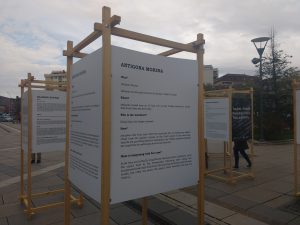

An installation telling the stories of women killed following domestic violence opened in front of the Kosovo Assembly building on Monday, with organizers inviting public officials to sign a commitment to ending domestic violence as part of the initiative.
To mark the International Day for the Elimination of Violence against Women, an installation named ‘The Last Story’ featuring the names and stories of victims of femicide and domestic violence is being displayed outside the Kosovo Assembly building from Monday, November 25 to Wednesday, November 27.
The installation details the circumstances of the deaths of 11 women in Kosovo over recent years, the same number that have been killed between 2017 and 2019, according to Kosovo Police reports. It was designed and implemented by the Kosovo Center for Counselling, Social Services and Research, SIT, and aims to commemorate these women and raise awareness among the public, as well as government and parliamentary officials, concerning the prevention of domestic violence.
“The stories of women who are being killed year by year are still kept private, and all we get to see are numbers and statistics,” said Mirishahe Syla, a gender advisor at SIT. “We want to allow people to have more connection to the women themselves. We called the installation ‘The Last Story,’ because this really is the last story of these women, and we hope that this will make people really feel what happened to these women and understand how serious a problem domestic violence is.”

Syla hopes that putting the details of their deaths in the spotlight will help the public to see beyond the statistics and reframe the nature of conversations surrounding domestic violence in Kosovo.
“Domestic violence is a public, not a private issue,” she said. “When we talk about domestic violence we don’t tend to see it as a crime, or we see it as only physical and not psychological violence. We chose this location so the public gets engaged and sees something in these stories that might seem familiar to them: everyone has families, husbands, wives, kids, and this would maybe speak to them on a closer level.”
SIT have also included a public commitment form as part of the installation, in the hope that newly elected MPs and other representatives from public institutions will sign the declaration and show their commitment to ending domestic violence.
Among the current signatories is civil servant Albana Lumi, who urged institutions to express their commitment to SIT’s initiative: “I think that all the institutions should react as quickly as they can,” she said. “They need to be quick in their response so that we can end domestic violence before things get this bad, and we continue to see women and girls being killed.”
Other signatories to the declaration include Avni Dehari, the father of Vetevendosje activist Astrit Dehari, Vetevendosje MP Saranda Bogujevci, former Ombudsperson Sami Kurteshi, Swedish ambassador to Kosovo, Karin Hernmarck Ahliny, and deputy Ombudsperson Marija Radulovic.
SIT has also been engaging in violence prevention efforts by working with high school students around Kosovo. “We ask students ‘what is violence?’” Syla said. “Most of the time they can identify it, but many realize they have seen, experienced or perpetrated it without actually knowing it is violence.”
According to Syla, introducing open and frank conversations about violence to young people as early as possible is one of the most effective ways to combat domestic violence. “After discussing it, you can see the students becoming more confident,” she explained. “Once they know that what they are experiencing is not okay and that violence is not normal, it makes them more empowered to fight against it and prevent it.”
Syla also highlights the need to increase public discussion on the subject at all levels of society, partly to move away from dominant narratives of domestic violence being intrinsically tied to wartime trauma. “It’s easier, or more acceptable, to make sexual violence a public issue when we talk about it within wartime,” she said. “Even here many will relate these stories of domestic violence to wartime trauma in some way, which is not true – domestic violence was a problem long before the war ever began. We need people talk publicly about domestic violence, and no longer see it as a domestic issue.”
If you have ever been affected in some way by sexual, gender-based or domestic violence, assistance and reporting mechanisms can be found through the Victims’ Assistance and Advocacy Division of the Kosovo Prosecution (0800 11 11 2) and the Kosovo Police hotline (0800 1 99 99).
25 November 2019 - 16:19

An installation telling the stories of women killed following domestic...

Naser Pajazitaj, who in March was convicted of murdering his cousin Do...

Kosovo citizens gathered in their hundreds to march around the center ...

The feminist movement in Kosovo has experienced a revival, but it rema...

Dozens of protesters marched in Gjakova today to protest the negligenc...
Lorem ipsum dolor sit amet, consectetur adipisicing elit. Optio, possimus obcaecati repellendus minus ut voluptatum laboriosam, neque fuga velit! Asperiores sint facere accusamus. Enim, omnis vero magnam beatae tenetur, et, architecto aliquid neque facilis itaque doloremque maxime sit. Alias sapiente ab odio corrupti reprehenderit beatae eius quis tempora, perspiciatis obcaecati culpa debitis molestias, officiis, nulla iste delectus tenetur sunt dolorem ea perferendis laboriosam, praesentium voluptatibus velit atque sint. Eligendi deserunt fugiat molestiae ex, animi, libero asperiores quis perferendis vero quibusdam, inventore dicta optio minus fuga reprehenderit officia quas dolorum error amet aliquid. Aut, non mollitia, corrupti nesciunt fuga vel hic.